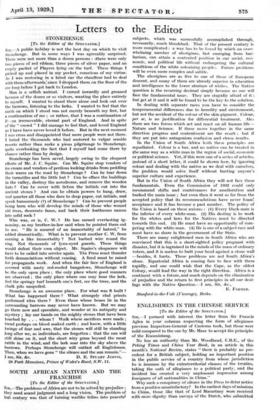SOUTH AFRICAN NATIVES AND THE FRANCHISE
[To the Editor of the SPECTATOR.] Sm,—The problems of Africa are not to be solved_by prejudice ; they need sound judgment and a long 'vision. The problem of last century was that of turning warlike tribes into peaceful
subjects, which was successfully accomplished through, necessarily, much bloodshed. That of the present century is more complicated : a way has to be found by which an over- whelming number of aborigines, fast emerging from bar- barism, can attain a contented position in our social, eco- nomic, and political life without endangering the cultural conditions of the white colonizing peoples. Future problems will be even more complex and subtle.
The aborigines are as five to one of those of European
descent, and many of them are already superior in education and intelligence to the lower stratum of whites. The Native question is the recurring decimal simply because no one will face the fundamental issue. They are stupidly afraid of it ; but get at it and it will be found to be the key to the solution.
In dealing with separate races you have to consider the
temperamental differences due to heredity and environment, but not the accident of the colour of the skin pigment. Colour, per se, is no justification for differential treatment. Also there are two forces which act and react on all human life— Nature and Science. If these move together in the saline direction progress and contentment are the result ; but if they are put into antagonism confusion and chaos results.
In the Union of South Africa both these principles are repudiated. Colour is a bar, and no native can be treated in the same way as a white man in the region of social, economic or political science. Yet, if this were one of a series of articles, instead of a short letter, it could be shown how, by ignoring colour and dealing with the native as we deal with ourselves, the problem would solve itself without hurting anyone's superior culture and experience.
But in the Union of South Africa they will not face these
fundamentals. Even the Commission of 1908 could only recommend shifts and contrivances for amelioration and burked the main issue.; but even then it went so far from the accepted policy that its recommendations have never found acceptance and it has become a past number. The policy of the Union is based on these axioms : (1) Every black-man is* the inferior of every white-man. (2) His destiny is to work for the whites and laws for the Natives must be directed towards this end. (3) He must have no opportunity of com- peting with the white-man. (4) He is one of a subject race and must have no share in the government of the State.
There are many enlightened men in South Africa who are
convinced that this is a short-sighted policy pregnant with disaster, but it is ingrained in the minds of the mass of ordinary voters, and it is useless to butt your head against a stone wall —besides, it hurts. These problems are not South Africa's alone. Equatorial Africa is coming face to face with them rapidly, and one could wish that the Cape, as the oldest Colony, would lead the way in the right direction. Africa is a continent with a future, and much depends on the elimination of prejudice and the return to first principles in all our deal- ings with the Native Question.—I am, Sir, &c.,
E. FARMER.
Stanford-in-the-Vale (Vicarage), Berks.


















































 Previous page
Previous page